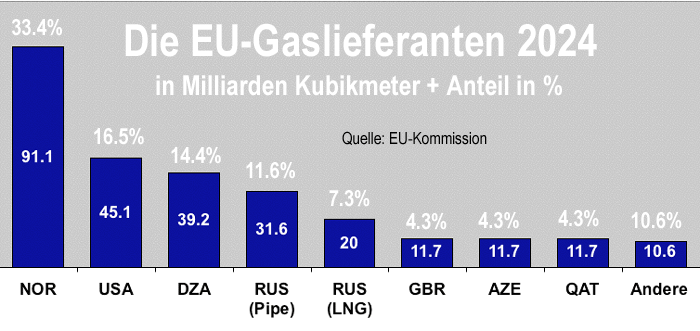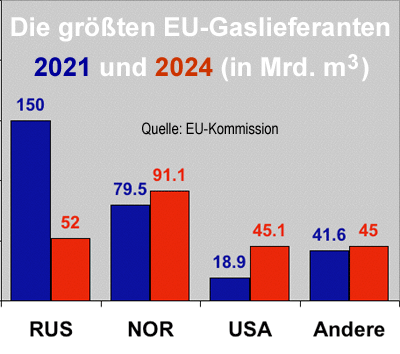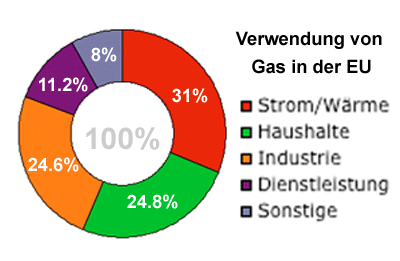 |
|
Norway has become the EU's most important natural gas supplier as a result of Russia's war of conquest against Ukraine. Last year, however, Russia still ranked second with a total share of almost 19 percent, followed by the US, Algeria, the UK, Azerbaijan, and Qatar. This chart distinguishes between pipeline and LNG deliveries in Russian EU imports. This is why the order of the country bars looks slightly different. If the newly agreed REPowerEU regulation comes into force in 2026 and is actually as effective as hoped, there will be no EU gas imports from Russia at all from 2028 onwards. For the Kremlin, this would mean the loss of many billions of euros that it has been using to finance its murderous war in Ukraine. |
EU member states decide to ban imports of Russian LNG from 2027
On October 23, EU member states agreed on a 19th package of sanctions against Russia. The new measures focus on key areas such as energy, finance, the military-industrial base, and special economic zones. Most notably, imports of Russian liquefied natural gas (LNG) will be banned from 2027. The previous exemptions for oil and gas imports from Russian energy companies Rosneft and Gazprom Neft will be lifted. However, this does not apply to Lukoil. At the insistence of Slovakia, Hungary, and Bulgaria, this Russian oil company will be allowed to continue supplying them.
The “shadow fleet” now comprises 577 ships
The list of Russia's “shadow fleet” is being expanded by 117 tankers. These are mostly older and sometimes scrap-ready oil and gas tankers that Russia has acquired on the world market in order to use them under foreign flags and under false ownership for the export of oil and liquefied natural gas. The 557 ships now on this list are not allowed to call at ports or receive services in the EU. Further sanctions are directed against companies and states that assist in the operation of the shadow fleet.
Slovakia once again extorted special assurances
As with the 18th package of sanctions (250708), Slovakia again took advantage of the requirement for unanimity in decision-making by only agreeing after special assurances were made. In addition to protection against higher energy prices, Slovak Prime Minister Robert Fico demanded that climate targets be adjusted to the needs of his country's car manufacturers and heavy industry.
US bans business with Rosneft and Lukoil because Trump feels duped by Putin
On the same day, the US Treasury Department imposed sanctions on the two Russian oil companies Rosneft and Lukoil. Affected companies were given until November 21 to terminate their business with the two oil producers. This surprising support for the European sanctions package was justified by Russian President Putin's refusal to end the war against Ukraine. US President Trump had previously canceled a planned meeting with Putin in Budapest because he did not expect much to come of it anyway. It seems that Trump is gradually realizing that Putin, whose favor he has so persistently sought, treats him like a mentally limited egomaniac. It remains to be seen how long a sanctions decision based on wounded pride will last.
The US sanctions could have an additional effect, particularly if India also reduces its oil imports from Russia under US pressure. Alongside China, India is the main buyer of Russian oil. Trump therefore accused India of filling Russia's war chest. As a punitive measure, he doubled US tariffs on products from India from 25 to 50 percent. On October 21, after talks with Indian Prime Minister Modi, he announced that Modi had agreed to reduce imports. Whether and to what extent this is actually true remains to be seen – as with everything Trump says.
Energy ministers agree on proposal for “REPowerEU” regulation
On October 20, EU energy ministers in Luxembourg agreed on a proposal
for a regulation that would introduce a legally binding, phased ban on
imports of both pipeline gas and liquefied natural gas (LNG) from
Russia. Unlike the 19th package of sanctions adopted by the Council
three days later, this complete ban will not apply to LNG until January
1, 2028. According to the Council's press release, this sends “an
ambitious signal to achieve the phase-out.” The planned regulation will
be a central element of the “REPowerEU” roadmap to end dependence on
Russian energy, which the EU Commission adopted in May of this year. It
had already presented a first draft in March 2022, which envisaged
ending dependence on fossil fuels from Russia by 2027 (220303).

